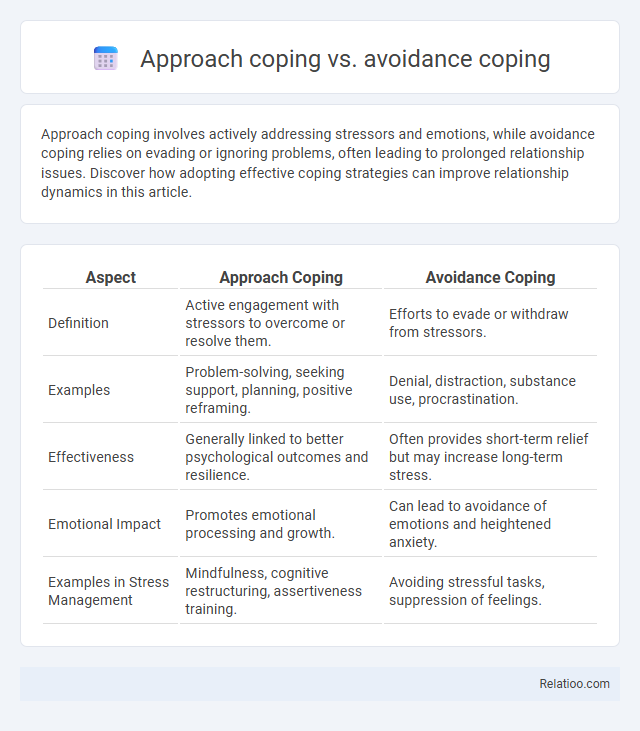Approach coping involves actively addressing stressors and emotions, while avoidance coping relies on evading or ignoring problems, often leading to prolonged relationship issues. Discover how adopting effective coping strategies can improve relationship dynamics in this article.
Table of Comparison
| Aspect | Approach Coping | Avoidance Coping |
|---|---|---|
| Definition | Active engagement with stressors to overcome or resolve them. | Efforts to evade or withdraw from stressors. |
| Examples | Problem-solving, seeking support, planning, positive reframing. | Denial, distraction, substance use, procrastination. |
| Effectiveness | Generally linked to better psychological outcomes and resilience. | Often provides short-term relief but may increase long-term stress. |
| Emotional Impact | Promotes emotional processing and growth. | Can lead to avoidance of emotions and heightened anxiety. |
| Examples in Stress Management | Mindfulness, cognitive restructuring, assertiveness training. | Avoiding stressful tasks, suppression of feelings. |
Understanding Coping Strategies: An Overview
Coping strategies are essential mechanisms your mind employs to manage stress and emotional challenges, categorized primarily into approach coping and avoidance coping. Approach coping involves confronting stressors directly by seeking solutions or emotional support, promoting resilience and long-term well-being. Avoidance coping, on the other hand, involves evading stressors through denial or distraction, which might provide temporary relief but can lead to increased anxiety over time.
What is Approach Coping?
Approach coping involves actively confronting stressors to manage emotional or practical challenges by seeking solutions, gathering information, or expressing feelings. It contrasts with avoidance coping, which involves evading stressors through denial, distraction, or withdrawal, often leading to temporary relief but potential long-term issues. Research in psychology highlights approach coping as more effective for mental health resilience and adaptive problem-solving in stressful situations.
What is Avoidance Coping?
Avoidance coping involves evading stressors or emotional distress by ignoring, denying, or withdrawing from the problem rather than addressing it directly. This strategy often leads to short-term relief but can result in long-term negative outcomes such as increased anxiety, unresolved issues, and impaired emotional regulation. In contrast to approach coping, which actively tackles stress through problem-solving and emotional processing, avoidance coping limits personal growth and resilience by circumventing challenges.
Key Differences Between Approach and Avoidance Coping
Approach coping involves actively confronting stressors through problem-solving and seeking emotional support, whereas avoidance coping refers to evading or distracting oneself from stressors to reduce immediate distress. Your ability to manage stress effectively depends on recognizing these key differences, as approach coping generally leads to better psychological outcomes and long-term resilience. Avoidance coping might provide temporary relief but often results in increased stress and unresolved issues over time.
Psychological Outcomes of Approach Coping
Approach coping involves directly addressing stressors through problem-solving, emotional processing, or seeking social support, leading to improved psychological outcomes such as reduced anxiety and enhanced resilience. Avoidance coping, which includes denial or withdrawal, often correlates with increased stress, depression, and poorer mental health over time. Your utilization of approach coping strategies can foster adaptive emotional regulation and promote long-term psychological well-being.
Psychological Outcomes of Avoidance Coping
Avoidance coping, characterized by evading stressors rather than confronting them, often leads to negative psychological outcomes such as increased anxiety, depression, and prolonged stress. In contrast, approach coping involves active problem-solving and emotional regulation, which generally promote resilience and better mental health. Understanding the impact of these coping strategies helps you develop healthier habits that improve psychological well-being.
When to Use Approach Versus Avoidance Coping
Approach coping involves actively addressing stressors through problem-solving or seeking support, while avoidance coping entails evading the stressor or denying its presence. You should use approach coping when the stressor is controllable and requires a proactive strategy to resolve or mitigate its impact. In contrast, avoidance coping may be beneficial in situations where stressors are uncontrollable, allowing temporary relief and emotional protection.
Factors Influencing Coping Strategy Choices
Factors influencing coping strategy choices include individual personality traits, the nature of the stressor, and the perceived controllability of the situation. Approach coping involves actively addressing the stressor through problem-solving or seeking social support, typically favored when the stressor is controllable and the individual exhibits higher resilience and optimism. Avoidance coping, characterized by denial or distraction, is more common in uncontrollable or chronic stress situations and among individuals with higher anxiety or lower self-efficacy.
Enhancing Adaptive Coping Skills
Enhancing adaptive coping skills involves strengthening approach coping strategies, which focus on confronting and managing stressors effectively through problem-solving and emotional regulation. Avoidance coping, characterized by evading stressors or denying the problem, is generally less effective and can exacerbate psychological distress. Prioritizing approach coping enhances resilience and promotes long-term mental health by fostering proactive engagement with challenges.
Practical Tips for Developing Healthy Coping Mechanisms
Approach coping involves actively addressing stressors through problem-solving and emotional regulation, while avoidance coping relies on evading the stressor, often leading to temporary relief but long-term challenges. Developing healthy coping mechanisms includes practicing mindfulness, building social support networks, and engaging in regular physical activity to improve emotional resilience. Prioritizing self-awareness and seeking professional guidance can enhance the effectiveness of approach coping strategies and reduce reliance on avoidance behaviors.

Infographic: Approach coping vs Avoidance coping
 relatioo.com
relatioo.com